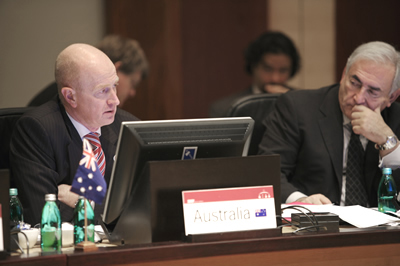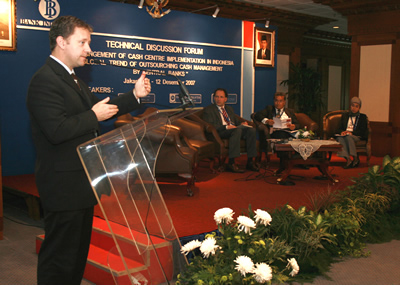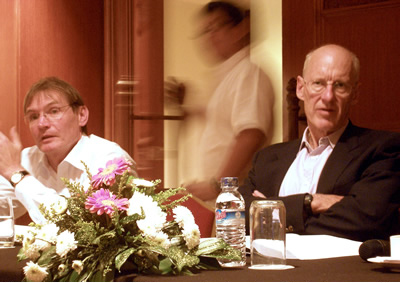Reserve Bank of Australia Annual Report – 2008 International Financial Co-operation
The Reserve Bank continued its regular participation in the major international financial groupings and institutions during 2007/08. Many of the discussions undertaken in these fora over the past year centred on the credit market disruptions that emerged in August 2007, the potential for these disruptions to spill over from the United States and Europe to other economies (many of whose markets were less exposed to structured finance products) and the role of central banks in responding to the conditions faced. Further detail on the Bank's involvement in international co-operation activities is outlined in this chapter.
Financial Stability Forum (FSF)
The FSF was first convened in 1999 in order to promote international financial stability, improve the functioning of financial markets and reduce the tendency for financial shocks to spread. The FSF aims to improve co-ordination and information exchange among countries and international agencies responsible for financial regulation and stability. It brings together senior representatives from the central banks, finance ministries and supervisory agencies of the G7 countries, as well as the heads of the European Central Bank and central banks of Australia, Hong Kong, the Netherlands, Singapore and Switzerland. Its membership also includes representatives from a number of international bodies, including the Basel Committee on Banking Supervision, the Bank for International Settlements and the International Monetary Fund.
As a result of the recent turbulence in credit markets, the G7 finance ministers and central bank governors asked the FSF in late 2007 to analyse the weaknesses that contributed to the financial market turmoil and to set out recommendations for increasing the resilience of markets and institutions. The FSF presented its Report on Enhancing Market and Institutional Resilience to the G7 in April 2008 and recommended actions in five areas:
- strengthening prudential oversight of capital, liquidity and risk management;
- enhancing transparency and valuation;
- changing the role and uses of credit ratings;
- strengthening the authorities' responsiveness to risks; and
- developing more robust arrangements for dealing with stress in the financial system.
In considering the areas for policy responses, the FSF gave priority to identifying corrective actions that were most likely to achieve tangible gains, whether these were actions by individual firms, private-sector groups or public authorities. Initiatives are already under way at both the international and domestic levels in the above five areas. The FSF will facilitate the co-ordination of these initiatives and report on progress in due course. In conjunction with other Australian financial authorities, the Reserve Bank is addressing the FSF's recommendations in an Australian context, with a particular focus on ongoing work to strengthen crisis management arrangements.
Bank for International Settlements (BIS) and Associated Committees
Given its broad membership (55 central banks and monetary authorities), the bimonthly BIS meetings are an effective vehicle for central bank governors to exchange views on a wide range of monetary, financial and central banking issues. This was especially the case during 2007/08 when developments in financial markets were rapidly evolving. At their meetings, governors were updated on the latest developments in credit markets and discussed the underlying causes and potential economic consequences of the turmoil. They also considered the output from a number of BIS-related committees that had undertaken detailed analyses of policy responses to the turmoil.
The Assistant Governor (Financial Markets) represented the Reserve Bank on two such BIS committees – the Committee on the Global Financial System (CGFS) and the Markets Committee. The CGFS examines issues relevant to the stability of financial markets and the global financial system, while the focus of the Markets Committee is on the short-run implications of current events for the functioning of financial markets. In order to gain a deeper understanding of issues that arose during the financial turmoil, the CGFS established two working groups of relevant experts. One of these groups examined the effectiveness of central banks' liquidity operations during the turmoil; the Assistant Governor (Financial Markets) represented the Reserve Bank on this group. The recommendations of the group were included in the FSF Report on Enhancing Market and Institutional Resilience as part of the proposals for developing more robust arrangements for dealing with stress in the financial system. Following a request from the FSF, the CGFS also asked a working group to re-examine issues raised in its report in 2005 on The Role of Ratings in Structured Finance. The reports from both of these groups were released by the CGFS in July 2008, as was a report by another CGFS working group that examined issues surrounding private equity and leveraged finance markets. Finally, the Reserve Bank's Chief Representative in Europe is participating in a CGFS working group examining issues surrounding capital flows to emerging market economies.
Given the importance of central banks' open market operations during the turmoil, the Markets Committee collated and published information on the monetary policy frameworks and market operations of its members. In addition, a senior manager from the Financial Markets Group participated in a taskforce that reported to the Markets Committee on the increased importance of commodity markets for financial markets.
On two occasions during the year, central bank governors from the Asian region met with the General Manager of the BIS in the BIS Asian Consultative Council. Members of the Asian Consultative Council also participated in an annual discussion with governors represented on the BIS Board, during which they discussed progress over the past decade in developing Asian money markets and the relative resilience of those markets to the recent turmoil in US and European markets.
Two senior officials from the Reserve Bank worked on secondment at the BIS during the year, while a number of senior officials participated in various conferences organised by the BIS at its Basel headquarters and at its Asian representative office in Hong Kong.
Group of Twenty (G-20)
The G-20 brings together 19 systemically important economies from all regions of the globe, as well as the European Union, IMF and World Bank. Its balanced representation of both advanced and emerging market economies gives it a unique perspective in addressing issues related to global economic and financial stability.
Over the past year, under the leadership of South Africa (2007 chair) and now Brazil (2008 chair), the G‑20 continued its work on developing the broad consensus that led to IMF Governors agreeing on the second stage of IMF voting reform, with members engaging in full and frank discussions at a series of meetings. The gradual convergence of the G-20 membership towards consensus was echoed in the broader IMF membership, with IMF Governors agreeing in April 2008 on a package of quota and vote reform to increase the voice of developing and emerging market economies (see below).
In keeping with its genesis in the financial crises of the 1990s, the G-20 is also actively discussing the recent crisis in credit markets, with the Reserve Bank chairing a G-20 Study Group on Global Credit Market Disruptions. The Study Group is exploring two issues: the causes of the recent credit market disruptions in developed financial systems, and the international transmission mechanisms from developed to emerging economies. The composition of the G-20 makes it well suited to such a discussion, with the Study Group's mission being to facilitate the sharing of information among G-20 members on their experiences. Deputies will consider the findings and discuss possible policy implications at their August 2008 meeting.

In 2008, the G-20 continued its regular round of discussions on selected policy themes. Members discussed, with private-sector and academic experts, the subjects of ‘Competition Policy in the Financial Sector’, ‘Clean Energy and Global Markets’ and ‘Fiscal Space for Growth and Social Policy’.
International Monetary Fund (IMF)
The past year has seen significant progress on the IMF's reform agenda. In April 2008, following two years of intensive discussions, IMF Governors voted in favour of changes to the quota and voting share structure to enhance the participation and voice of emerging market and developing countries, and realign members' shares with their relative weight and role in the global economy. A second major reform during 2007/08 was the agreement on a new and sustainable income and expenditure framework, which will transform the IMF's income model from one that primarily relies on lending to one that generates revenue from various sources, including by broadening its investment authority.
The IMF is continuing to reform its day-to-day activities, with the recent financial market crisis providing added impetus to existing efforts to enhance and deepen its surveillance work in the financial sector and financial markets areas. The Reserve Bank strongly supports the Fund's efforts in these areas. As part of its own efforts to strengthen capacity, particularly at the IMF Executive Board, the Reserve Bank decided in 2008 to sponsor an adviser to the Office of the Executive Director for Australia at the IMF. The adviser's key focus is on providing advice on capital market and financial sector supervision issues, as well as the role of the IMF in global crisis prevention and crisis management. In addition, the Head of International Department visited China, along with IMF staff, to provide expert advice on the requirements associated with the IMF's Financial Sector Assessment Program and financial stability analysis issues, while a senior manager from the Bank's Financial Markets Group was a member of an IMF technical assistance mission to the Bank of Thailand.
Executives' Meeting of East Asia-Pacific Central Banks (EMEAP)
EMEAP is the primary forum for co-operation among central banks in the Asia-Pacific region. As noted in last year's annual report, the framework for EMEAP's oversight of monetary and financial issues was strengthened with the creation of a separate committee, the Monetary and Financial Stability Committee (MFSC). During 2007/08, the meetings of the MFSC were a key vehicle for EMEAP deputy governors to discuss the events unfolding in global credit markets and share experiences of the effects on their own economies.
EMEAP deputy governors also have responsibility for overseeing the work undertaken by EMEAP's three working groups: the Working Group on Banking Supervision, the Working Group on Financial Markets and the Working Group on Payments and Settlement Systems. With the formation of the MFSC, the surveillance role of the working groups has also been enhanced. Hence, many of the discussions of the working groups during the year focused on the disruptions in credit markets in the United States and Europe and the potential channels for their transmission to the economies of east Asia. Following a presentation by the Head of the FSF Secretariat to its meeting in May 2008, the MFSC asked the working groups to consider the relevance of the FSF recommendations for Asia.
Continuing a practice adopted in recent years, EMEAP governors met with their counterparts from the Eurosystem at a joint seminar in June 2008. Discussions ranged across short-term challenges facing central banks, including the pick-up in global inflationary pressures and ongoing financial turmoil, to more long-term issues such as the implications of climate change and associated policies for price stability.
Government Partnership Fund (GPF)
Since 2005, the Reserve Bank has had an extensive capacity-building program in place with Bank Indonesia (BI) under the Australian Government's Government Partnership Fund. This program is aimed at supporting Indonesia's economic governance and public sector through an exchange of skills and knowledge between Australian public-sector institutions and their Indonesian counterparts.
Over time, the range of activities involving the exchange of staff between the Reserve Bank and BI has expanded from the core areas of monetary policy, financial markets and financial stability to encompass nearly all aspects of central banking. In 2007/08, agreement was reached to include a further two areas, human resources and auditing, in the program. Staff exchanges between the two central banks numbered nearly 40 in 2007/08, bringing the total number of exchanges to around 75 since the first year of the program in 2005/06.


Among the visits by Reserve Bank staff to BI, in March 2008 staff from the Economic and Financial Markets Groups participated in a workshop on Indonesian inflation and exchange rate issues, representing the culmination of joint research work over the previous year. Also in March, a senior manager from the Bank conducted a workshop on money market operations, with a second workshop held in July 2008. Several officers from the Note Issue Department participated in a forum on cash processing and distribution in late 2007, while an officer from one of the Bank's State Offices participated in a seminar on business liaison at the Bandung Branch of BI in February 2008.
South Pacific Central Bank Co-operation
The Reserve Bank places considerable importance on promoting relations with the central banks of the South Pacific region. The annual meeting of South Pacific Central Bank Governors provides a forum for governors from those countries with their own currencies – Australia, Fiji, New Zealand, Papua New Guinea, Samoa, Solomon Islands, Tonga and Vanuatu – to discuss a range of financial and monetary issues, including some that are unique to small island economies. The December 2007 meeting was hosted by the National Reserve Bank of Tonga in Nuku'alofa, Tonga. Representatives from the BIS, IMF and the Pacific Financial Technical Assistance Centre (PFTAC) also participated. The main issues discussed were regional central bank legislation, the development of financial systems of member countries, the management of foreign exchange reserves and the channels through which overseas economic developments affected Pacific island economies.
The Reserve Bank continued to foster close relations through a series of bilateral visits. A manager from the Financial Markets Group visited the Reserve Bank of Vanuatu and the Central Bank of Solomon Islands to discuss areas for potential technical co-operation, as well as participating in a joint Bank of England-PFTAC-IMF workshop in Vanuatu on central bank operations, settlement and monetary policy issues. Another staff member from the Financial Markets Group presented to the Board of the Bank of Papua New Guinea on issues relating to foreign exchange reserves management.
Bilateral Relations and Co-operation
In recent years the focus of the Reserve Bank's international co-operation has shifted away from long-term secondments of our staff overseas, or the long-term hosting of visitors in Australia, towards providing information and assistance via short-term visits to the Reserve Bank and through electronic means. This shift has been facilitated by improvements in IT. The Reserve Bank received short-term visitors from a range of countries during the year, including Bangladesh, Chile, the People's Republic of China, Malaysia, Pakistan, South Africa, South Korea, Thailand, Timor-Leste, Tonga and Vanuatu. The focus of the visits varied greatly and (where appropriate) the Reserve Bank was willing to share information across the full range of its operations.
A manager from the International Department provided advice on reserves management to the Bank of Papua New Guinea, and the Reserve Bank hosted a senior officer from the Reserve Bank of India (RBI) for three months, focusing on a wide range of human resource topics. That visit was part of a new exchange initiative between the two central banks, which will involve the reciprocal placement of a Reserve Bank officer in RBI's head office in Mumbai in late 2008.
